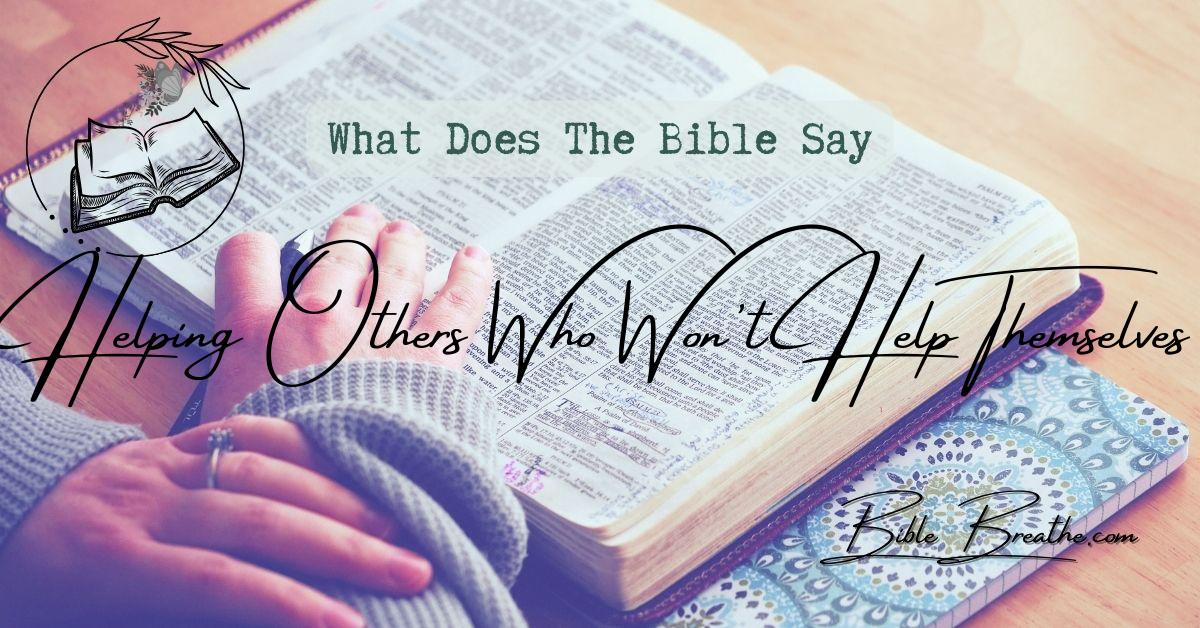What’s the deal with helping folks who won’t lift a finger to help themselves?
It’s like holding an umbrella over someone who refuses to step out of the rain.
We’ve all been there, torn between compassion and not becoming someone’s crutch.
The Bible’s got plenty to say about this.
On one side, we’re told to “love your neighbor” and that’s gospel truth, right?
But then you’ve got Apostle Paul talking about working for your bread and not being a burden.
It’s like the Proverbs dropping wisdom bombs on laziness, warning us about the pitfalls.
So, do we offer a handout and keep our hearts warm, or do we risk enabling bad choices?
In this spiritual journey, we’ll unpack these Biblical gems, learning how to be compassionate without being naive.
It’s not just about a handout; it’s about helping folks stand on their own two feet and grow.
Ready to dive in?
📖💪
Key Takeaways
- The Bible emphasizes the importance of discernment when helping others who may not be willing to help themselves. While compassion is a virtue, it’s essential to assess the situation and determine the most appropriate way to offer assistance.
- Finding a balance between compassion and wisdom is crucial. It’s essential to extend a helping hand to those in need, but it’s equally important to encourage self-reliance and personal responsibility.
- The Bible underscores the value of self-reliance and discipline. Proverbs 6:6-8, for example, mentions the wisdom of the ant, which works diligently to provide for itself. This principle encourages individuals to take initiative and responsibility for their lives.
- Helping those who won’t help themselves can be a challenging and complex endeavor. It requires patience, understanding, and a willingness to guide and empower individuals to make positive changes in their lives.
- Ultimately, the Bible’s perspective on helping others who may be reluctant to help themselves calls for a balanced approach. It encourages us to extend compassion while also promoting personal growth and responsibility, striving to uplift those in need without enabling self-destructive behavior.
Diving into Biblical Wisdom on Helping Others

Photo modified by BibleBreathe.com. Original photo by Ivan Babydov on Pexels
Hey there!
Ever wondered what the good ol’ Bible has to say about lending a hand to those who might not seem to lend a hand to themselves?
Well, PASTOR Mike’s got your back, and we’re about to unpack this together.
The Commandment of Jesus: Love Unconditionally
Jesus?
Oh, he was all about the love train.
He tells us to love everyone, even those folks who aren’t exactly on our ‘fan’ list.
Loving even our enemies, that’s what he preached.
Imagine that!
Sharing kindness without expecting anything in return.
It’s like giving your buddy an extra slice of pizza just because.
But here’s the plot twist: Sometimes, folks have twisted this beautiful idea.
They’ve taken love and turned it into a hall pass for laziness or undisciplined living.
Now, that’s not what Jesus meant, right?
Finding the Right Balance
We need to strike a balance, just like juggling.
The Apostle Paul and that famous Sermon on the Mount talk about love and kindness, but they also nudge us towards self-reliance and discipline.
It’s like cheering on your friend as they learn to ride a bike – a bit of a wobbly start, but they’ll soon pedal on their own.
Compassion needs to buddy up with wisdom.
Think of it like a coach guiding a young athlete.
We can’t just keep giving without thinking.
The Bible’s got proverbs that shout about laziness and the value of working hard.
Sometimes, the most caring thing is giving a nudge towards growth and independence.
Navigating with Faith and Smarts
Let’s not get tired of doing good, folks, just like planting seeds in a garden.
Eventually, we’ll see the harvest if we hang in there.
That’s the promise!
So, let’s be smart farmers, sowing seeds of love and kindness with an eye on the bigger picture.
Let us not become weary in doing good, for at the proper time we will reap a harvest if we do not give up.” – Galatians 6:9 (NIV)
When Helping Those Who Seem Unwilling to Help Themselves

Photo modified by BibleBreathe.com. Original photo by Andrea Piacquadio on Pexels
Hey there, my dear friends!
Today, we’re going to dive deep into the Bible’s wisdom on a topic that’s so relevant in our lives – helping those who might not seem too eager to help themselves.
We’ll do this with the guidance of the Apostle Paul, who shares a perspective that’s both practical and heartwarming.
Balancing Your Acts
“Each person must take responsibility for themselves.” – Galatians 6:5 (KJV)
Paul’s words remind us of something fundamental.
It’s like being a gardener in your backyard.
You plant the seeds, water them, and make sure they get enough sunlight.
But you don’t chew the food for them; they have to grow on their own.
Similarly, while helping others is a beautiful thing, it doesn’t mean we should do everything for them.
See, it’s about maintaining a balance.
Just like the shepherd who takes care of his flock but also expects the sheep to move and eat.
In the same way, we’re called to help others while also encouraging them to take their own steps, to grow and stand on their own feet.
Compassion Meets Wisdom
*”Give a man a fish, and he eats for a day.
Teach a man to fish, and he eats for a lifetime.”*
This old saying really hits the nail on the head.
It’s about having a heart full of compassion and a head full of wisdom.
When you see someone in need, it’s not just about handing them a solution for today; it’s about giving them the tools and knowledge to sustain themselves for a lifetime.
Think about the Good Samaritan.
He didn’t just toss some coins at the wounded man and walk away.
He went the extra mile, making sure the man could stand on his own two feet in the future.
That’s the balance we’re talking about – compassion and wisdom working hand in hand.
Self-Reliance: A Biblical Virtue
“If you don’t take care of your own family, you’re worse than an unbeliever.” – 1 Timothy 5:8 (KJV)
The Bible makes it crystal clear that taking care of your own is a virtue.
It’s like a family meal, where everyone chips in to set the table, cook, and clean up.
It’s not just one person’s job; it’s a shared responsibility.
When you help others become self-reliant, you’re not only living by biblical principles, but you’re also building their self-esteem and sense of responsibility.
Think of it like teaching a kid to ride a bike.
You start with training wheels, and little by little, you let go.
So, when you find yourself in a situation where you’re helping someone who might not seem too eager to help themselves, remember this: offer your support, guide them, but also encourage their self-reliance.
It’s not just about doing the right thing; it’s about nurturing them to reach their full potential, just as God intended.
What’s the Bible Got to Say About Helping Those Who Won’t Help Themselves?

Photo modified by BibleBreathe.com. Original photo by Nothing Ahead on Pexels
Unpacking the Meaning of “Undisciplined”
Now, let’s dive into the Bible and unpack some wisdom for the everyday challenges we face.
When it comes to lending a hand to folks who might not seem too eager to help themselves, the Bible uses a fancy Greek word called “ataktos.”
Now, don’t be overwhelmed by the big word; it’s like your GPS in this journey through life.
Ataktos essentially means someone who’s a bit undisciplined, maybe even looking like they’re not pulling their weight.
But before we go any further, remember, we’re all on a different path, and sometimes, people need a little more guidance.
Tales of “Do Nothing” and Their Lessons
The Bible is like a treasure chest full of stories and lessons, and it has something to say about the “do nothing” attitude.
Take the Apostle Paul, for example.
He was like a mentor, dropping some serious wisdom bombs in his letters.
In 2 Thessalonians 3:10 (KJV), he didn’t pull any punches: “For even when we were with you, this we commanded you, that if any would not work, neither should he eat.”
Paul was getting at the idea that we should take responsibility for our lives and put in some elbow grease.
But remember, that doesn’t mean we just abandon those who might be struggling.
It’s all about balance.
Balancing Compassion and Wisdom
See, the Bible isn’t just about tough love.
It’s also packed with compassion, and it encourages us to love our neighbors and show kindness.
In the famous Sermon on the Mount, Jesus spilled the beans on compassion, but here’s the kicker – it should go hand in hand with wisdom.
Let me tell you, there’s a thin line between helping and enabling.
You don’t want to be the enabler of someone’s bad choices, right?
The Book of Proverbs, it’s like a treasure map for life, talking about laziness and the fallout of it.
It’s like a guidebook for figuring out when to give a hand and when to nudge someone to grow.
As you wrestle with this topic, know this: the Bible nudges us to be kind, compassionate, but also wise.
It’s about finding that sweet spot between offering a hand up and nudging someone toward self-improvement.
Keep in mind that all of this is wrapped up in a big, beautiful package of love for our neighbors.
So, young or old, let’s learn from these timeless teachings and navigate this journey of life with grace and wisdom.
Extending a Hand When Hands Hang Idle: Biblical Insights on Assisting the Unmotivated

Photo modified by BibleBreathe.com. Original photo by Kelly on Pexels
Proverbs Unveiled: The “Do Nothing” Individual
Now, let’s talk about those folks whose dreams are like a car with no gas, just parked there collecting dust.
You ever met someone whose get-up-and-go got up and went?
Yeah, Proverbs 21:25-26 calls them out!
It’s like having a field ready for a harvest, but you choose to Netflix and chill instead.
Killer, right?
The desire of the slothful killeth him; for his hands refuse to labour. He coveteth greedily all the day long: but the righteous giveth and spareth not.” – Proverbs 21:25-26 (KJV)
Reaping the Harvest of Laziness
Imagine walking by a garden neglected, overgrown with weeds, and you know it could be flourishing.
That’s the picture Proverbs 24:30-34 paints.
It’s like having a toolbox full of potential, but never taking it out to fix things up.
We’ve got to be about more than just chilling in the shade.
“I went by the field of the slothful, and by the vineyard of the man void of understanding; And, lo, it was all grown over with thorns, and nettles had covered the face thereof, and the stone wall thereof was broken down. Then I saw, and considered it well: I looked upon it, and received instruction.” – Proverbs 24:30-32 (KJV)
Now, when we lend a hand to those stuck in life’s waiting room, we gotta be smart about it.
It’s like helping a friend assemble a puzzle—you don’t just do it for them, you guide them, you cheer them on.
Love’s gotta come with a side of wisdom, encouraging growth while avoiding the trap of making laziness a comfy recliner.
In the big story of the Bible, it’s all about having a heart that’s both soft and smart.
Ready to reach out, but also ready to stand strong and say, “Hey, you’ve got this!
Now, let’s rise and shine.”
Why God’s Love Demands a Balanced Approach: PASTOR MICHAEL TODD’s Take on Helping Those Who Won’t Help Themselves

Photo modified by BibleBreathe.com. Original photo by SHVETS production on Pexels
In this journey of faith, we’re diving deep into a real question that hits home for many: what does the Bible say about helping those who won’t help themselves?
Grab a seat because we’re breaking it down, PASTOR MICHAEL TODD style!
Paul’s Straight Talk: Work or No Feast
Alright, family, the Apostle Paul ain’t beating around the bush.
He’s dropping truth bombs in 2 Thessalonians 3:10, saying if someone’s not putting in the work, they shouldn’t be first in line at the feast.
It’s like saying, “You want the blessings?
Put in the effort!”
“For even when we were with you, this we commanded you, that if any would not work, neither should he eat.” – 2 Thessalonians 3:10 (KJV)
This ain’t about being harsh; it’s about embracing responsibility and showing that the dinner table is reserved for those who bring something to it.
Compassion Check: Love Your Neighbor, but Don’t Enable
Now, let’s talk heart.
We’re called to love our neighbors, no doubt.
But it’s a tricky dance between showing compassion and not becoming a partner in someone’s self-destructive journey.
It’s like having a friend addicted to candy, and you keep buying it for them – that’s not love, that’s enabling.
Jesus’ Wisdom: Sermon on the Mount Vibes
Remember that Sermon on the Mount?
Jesus was laying down wisdom, teaching us to live righteously.
It’s all about having a heart full of compassion, but let’s not confuse that with giving a free pass to undisciplined living.
We’re called to be wise as serpents and gentle as doves.
Proverbs Reality Check: Laziness Has Consequences
Proverbs, the book of real talk, gives us a heads up about laziness.
It’s not a scolding; it’s a nudge to wake up.
Financial assistance is cool, but it’s got to be a game-changer, not a crutch.
Proverbs wants us to be smart helpers, not enablers.
So, family, as we tackle this real issue, let’s keep it real ourselves.
How do we show God’s love without becoming enablers?
How can our help be a launchpad for someone’s comeback story?
That’s the journey we’re on – together.
Guiding with Love: Nudging Toward Growth

Photo modified by BibleBreathe.com. Original photo by Designecologist on Pexels
In this incredible journey we call life, we often find folks grappling with the chains of self-defeat.
They’re stuck in loops that seem impossible to break, trapped in their own struggles.
As followers of Christ, we’re called to lend a helping hand, to love them just like Jesus did.
But hey, how do we do that without getting trapped ourselves?
Let’s dig into the Word and figure it out.
Love that Uplifts, Not Enabling Stuck-ness
You know, love is a powerful thing.
We’re told to love our neighbors, but let’s get this straight: love isn’t about turning a blind eye to someone’s harmful choices.
It’s not about helping them stay stuck.
Apostle Paul, the OG Jesus-follower, dropped this wisdom in Ephesians 4:15 (KJV):
“Speak the truth, but do it wrapped in love, so we all grow up and become like Jesus.”
It’s about telling the truth, but doing it in a way that helps people level up.
Pleasing vs. Really Helping: Let’s Break it Down
Let’s talk about pleasing people versus truly helping them.
Pleasing might feel good in the moment, but it’s like giving someone candy when they need a full meal.
It’s like a temporary fix.
Jesus, during His Sermon on the Mount, wasn’t just handing out what people wanted; He was giving them what they needed for their souls.
In this assistance game, wisdom is our coach.
Proverbs 13:4 (KJV) drops a truth bomb:
Lazy folks want the world, but they end up with nothing. Hard workers? Oh, they’re the ones who feast.”
Translation?
It’s about putting in the effort and wanting growth, not just coasting through life.
Compassion Wrapped in Truth
Our compassion has to be a mix of love and truth.
It’s like a blend of heart and brain, knowing when to hold on and when to let go.
Proverbs 19:17 (KJV) reminds us:
“Helping out the poor? You’re lending to God. And trust me, God pays back big.”
So, when we help with discernment, it’s like giving God a loan, and trust me, God’s got a hefty repayment plan.
In a nutshell, love should push us to help, but not just any help—it should empower growth.
Let’s be love carriers, guiding with compassion and smarts, leading hearts toward growth and self-reliance, wrapped up in God’s amazing grace.
Frequently Asked Questions (FAQs) About What Does The Bible Say About Helping Others Who Won’T Help Themselves
What does the Bible say about giving financial assistance to the poor?
The Bible emphasizes the importance of helping the poor.
In Proverbs 19:17, it states, ‘Whoever is kind to the poor lends to the Lord, and he will reward them for what they have done.’ This highlights the divine significance of supporting those in need.
Is it better to give than to receive according to the Bible?
Yes, according to Acts 20:35, ‘It is more blessed to give than to receive.’ This verse emphasizes the value of generosity and selflessness.
Should a church financially support a PASTOR in retirement?
Supporting a PASTOR in retirement varies among churches.
Some communities provide pension plans or financial aid to retired PASTORs as a gesture of appreciation and to help sustain them after years of service.
It reflects the church‘s commitment to honoring and caring for their spiritual leaders during their retirement years.

